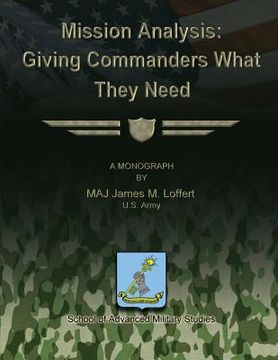Compartir
Mission Analysis: Giving Commanders What They Need (en Inglés)
Us Army James M. Loffert
(Autor)
·
School Of Advanced Military Studies
(Contribuciones de)
·
Createspace Independent Publishing Platform
· Tapa Blanda
Mission Analysis: Giving Commanders What They Need (en Inglés) - Studies, School Of Advanced Military ; Loffert, Us Army James M.
S/ 103,16
S/ 206,31
Ahorras: S/ 103,16
Elige la lista en la que quieres agregar tu producto o crea una nueva lista
✓ Producto agregado correctamente a la lista de deseos.
Ir a Mis Listas
Origen: Estados Unidos
(Costos de importación incluídos en el precio)
Se enviará desde nuestra bodega entre el
Lunes 22 de Julio y el
Miércoles 31 de Julio.
Lo recibirás en cualquier lugar de Perú entre 2 y 5 días hábiles luego del envío.
Reseña del libro "Mission Analysis: Giving Commanders What They Need (en Inglés)"
The purpose of this monograph is to answer the research question: does the current process for executing mission analysis give commanders the information they need to develop timely, relevant, and constructive commander's intent and commander's guidance. This paper focused on the first two aspects of battle command: visualization and description. There are problems with the doctrinal mission analysis process that hinders commanders and their staffs in visualizing and describing an operation. The over-arching problem occurring during execution of the current mission analysis process is that staffs are not giving commanders what they need to complete their required deliverables at the conclusion of the mission analysis brief: timely, relevant, and constructive initial commander's intent and commander's planning guidance. In its current form, the mission analysis process fails to address three fundamental problems during the execution of mission analysis. First, it does not take into account the lack of sufficient relevant experience of most staff members to intuitively see the relevant conclusions from the information gathered by the process. Second, it does not adequately describe the complex nature of the commander and staff relationship and how the staff uses each step of the mission analysis process to assist the commander. Lastly, the mission analysis process does not assist staffs to present the information gathered from the process in a manner that properly frames the problem and relates proper context to the commander in order to facilitate the development of his intent and guidance. Although solving the problem of inexperience is beyond the scope of this paper, the proposal does recommend several methods commanders and staffs can use to mitigate for lack of relevant experience. As for the other two problems, the mission analysis construct is good, but not complete. The current doctrine for mission analysis is incomplete in four areas: it fails to fully convey understanding to staffs as to what mission analysis is designed to do; it does not adequately explain how to frame a problem for a commander and staff in order to give greater context to situational understanding; it does not adequately discuss the dynamics of the mission analysis process in interaction with various commander personalities; and it does not adequately suggest how to assist a commander in getting information before mission analysis while he is developing his intent and guidance. By understanding how a commander makes decisions in naturalistic environments, a staff can be more efficient in finding and presenting the type of information he needs in order to complete his pattern recognition. Adequately framing the problem through context requires describing the purpose of the operation over time in relation to space and resources. The future FM 5-0 should describe the dynamics of commander-staff interaction and their impact on mission analysis. The staff should understand that they must adapt to the commander, and not the other way around. The staff must discover how their commander expresses himself, receives information, and interprets information. The future FM 5-0 should describe the nature and need for commander-staff collaborative planning. The doctrine should address the benefits of information sharing between the commander and staff before the mission analysis brief. This paper has not only identified problems with the current doctrinal process, but it has provided solutions to mitigate them. If the proposal of this paper is implemented in the future FM 5-0 (Army Planning and Orders Production) the U.S. Army could greatly improve the effectiveness of the mission analysis process and improve shared battlefield visualization and description by commanders and their staffs.
- 0% (0)
- 0% (0)
- 0% (0)
- 0% (0)
- 0% (0)
Todos los libros de nuestro catálogo son Originales.
El libro está escrito en Inglés.
La encuadernación de esta edición es Tapa Blanda.
✓ Producto agregado correctamente al carro, Ir a Pagar.

